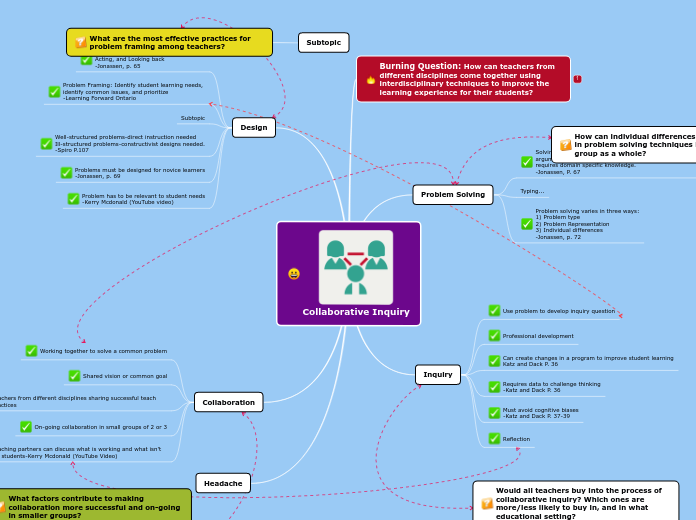
Collaborative Inquiry
Burning Question: How can teachers from different disciplines come together using interdisciplinary techniques to improve the learning experience for their students?
Problem Solving
Solving ill-structured problems requires metacognition and argumentation whereas solving well-structured problems requires domain specific knowledge.
-Jonassen, P. 67
Typing...
Problem solving varies in three ways:
1) Problem type
2) Problem Representation
3) Individual differences
-Jonassen, p. 72
Inquiry
Use problem to develop inquiry question
Professional development
Can create changes in a program to improve student learning
Katz and Dack P. 36
Requires data to challenge thinking
-Katz and Dack P. 36
Must avoid cognitive biases
-Katz and Dack P. 37-39
Reflection
Design
IDEAL Model: Identify, Define, Explore,
Acting, and Looking back
-Jonassen, p. 65
Problem Framing: Identify student learning needs,
identify common issues, and prioritize
-Learning Forward Ontario
Subtopic
Well-structured problems-direct instruction needed
Ill-structured problems-constructivist designs needed.
-Spiro P.107
Problems must be designed for novice learners
-Jonassen, p. 69
Problem has to be relevant to student needs
-Kerry Mcdonald (YouTube video)
Collaboration
Working together to solve a common problem
Shared vision or common goal
Teachers from different disciplines sharing successful teach practices
On-going collaboration in small groups of 2 or 3
Teaching partners can discuss what is working and what isn't for students-Kerry Mcdonald (YouTube Video)
Headache
Would all teachers buy into the process of collaborative inquiry? Which ones are more/less likely to buy in, and in what educational setting?
What factors contribute to making collaboration more successful and on-going in smaller groups?
How can individual differences/experiences in problem solving techniques benefit the group as a whole?
What are the most effective practices for problem framing among teachers?
Subtopic
References:
Jonassen, D. (2000). Toward a design theory of problem solving. Educational Technology Research and Development, 48(4), pp.63-85.
Learning Forward Ontario. (2011). Collaborative inquiry: A facilitator’s guide. Retrieved from http://misalondon.ca/PDF/collabpdfs/Collaborative_Inquiry_Guide_2011.pdf
Spiro, R. J., & DeSchryver, M. (2009). Constructivism: When It’s the Wrong Idea and When It’s the Only Idea. In Signmund Tobias & Thomas M. Duffy (Eds.), Constructivist Instruction: Success or Failure (p. 106-123). New York, NY: Routledge.
Subtopic
Subtopic
